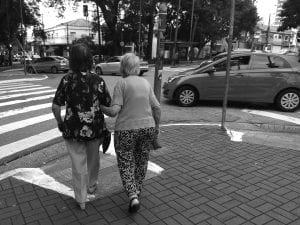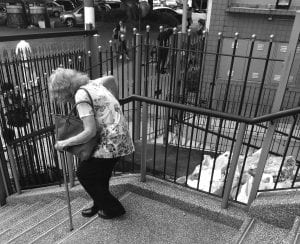Dependence is the new death
By Marilia Duque E S, on 13 March 2019

Since the beginning of my fieldwork, I’ve been asking people about death and the meaning of life. I thought that on reaching old age, people would accept death more readily and that consciousness (or fear) of death would drive them to philosophical questions about life propose, finitude and legacy. Generally they do experience death more closely: their parents are sick or died a few years ago and so do some of their close friends. But besides their grief, death is not a big issue for them. Religion and spiritual beliefs seem to bring enough comfort and resilience to deal with the end of life and life after death. “I know I am mortal”, “Life doesn’t end here” and “It is a natural thing” are expressions they use when I ask them about death.
In The Philosophy of Ageing, Time and Finitude, Baars (1) argues that consciousness of death is not the only trigger that puts life in perspective. The author highlights that we frequently face extreme situations that make us abandon idols and ideals of what life should be. At those moments, there is just real life and a balance of the past that would give the present and future some meaning. To my informants, dependence became this trigger. Many of them see the loss of autonomy as a first death and some of them wish they could die at the exact moment when they become dependent on others.
On the one hand, they are not sure if their children will take care of them in later years. When I ask them, they answer that they don’t know or they don’t think so or they don’t expect them to. “Things are different now”, they explain. On the other hand, they don’t want to become a burden especially for their kids. Martha, for example, a 63 year-old woman who takes care of her children, had made up her mind. She already told her kids that if she had Alzheimers she would prefer to go to a clinic. “They don’t deserve this burden”, she said.
Like Martha, Linda is not afraid of death, but what comes “before death” is a different matter. She prefers to try to remain healthy as long as she can. In her 70s, she still runs marathons and takes special care of her diet and sleep. Regarding her kids, she believes this is her obligation “people who don’t take care of their health don’t deserve to stay alive”.
There are also people that just don’t want to lose the right to make decisions about their own lives. Maria for example is a very independent 67 year-old woman. She calls herself “bossy” when she talks about family decisions. “I can’t stand the idea that at a certain point in my life my children will think they can tell me what I can or can’t do”, she said.
If dependence is the new trigger for the consciousness of finitude, a good question to ask would be: what gives life a sense of purpose then? My first answer would be legacy. But what I found is that the past is not enough to fulfil life before dependence comes. As my colleague Pauline, who is conducting her fieldwork in Ireland, found out, my informants are more concerned with what they are doing today. They want to feel useful by learning new stuff, engaging with new projects, volunteering or filling their time with whatever they can. Their autonomy is their legacy and that puts life in perspective.
Reference:
Baars, Jan. Philosophy of Aging, Time, and Finitude. In: Thomas R. Cole, Ruth E. Ray and Robert Kastenbaum (eds), A Guide to Humanistic Studies in Aging: What Does it Mean to Grow Old?, The Johns Hopkins University Press, Baltimore, Maryland, 2010
 Close
Close





